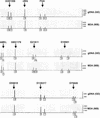Unbiased whole-genome amplification directly from clinical samples
- PMID: 12695328
- PMCID: PMC430878
- DOI: 10.1101/gr.816903
Unbiased whole-genome amplification directly from clinical samples
Abstract
Preparation of genomic DNA from clinical samples is a bottleneck in genotyping and DNA sequencing analysis and is frequently limited by the amount of specimen available. We use Multiple Displacement Amplification (MDA) to amplify the whole genome 10,000-fold directly from small amounts of whole blood, dried blood, buccal cells, cultured cells, and buffy coats specimens, generating large amounts of DNA for genetic testing. Genomic DNA was evenly amplified with complete coverage and consistent representation of all genes. All 47 loci analyzed from 44 individuals were represented in the amplified DNA at between 0.5- and 3.0-fold of the copy number in the starting genomic DNA template. A high-fidelity DNA polymerase ensures accurate representation of the DNA sequence. The amplified DNA was indistinguishable from the original genomic DNA template in 5 SNP and 10 microsatellite DNA assays on three different clinical sample types for 20 individuals. Amplification of genomic DNA directly from cells is highly reproducible, eliminates the need for DNA template purification, and allows genetic testing from small clinical samples. The low amplification bias of MDA represents a dramatic technical improvement in the ability to amplify a whole genome compared with older, PCR-based methods.
Figures






References
-
- Beaucage S.L., Bergstrom, D.E., Glick, G.D., and Jones, R.A., 2001. Current protocols in nucleic acid chemistry. John Wiley, New York, NY.
-
- Blanco L., Bernad, A., Lazaro, J.M., Martin, G., Garmendia, C., and Salas, M. 1989. Highly efficient DNA synthesis by the phage φ 29 DNA polymerase. Symmetrical mode of DNA replication. J. Biol. Chem. 264: 8935-8940. - PubMed
-
- Davies H., Bignell, G.R., Cox, C., Stephens, P., Edkins, S., Clegg, S., Teague, J., Woffendin, H., Garnett, M.J., Bottomley, W., et al. 2002. Mutations of the BRAF gene in human cancer. Nature 417: 949-954. - PubMed
Publication types
MeSH terms
Substances
LinkOut - more resources
Full Text Sources
Other Literature Sources
Molecular Biology Databases
Research Materials
